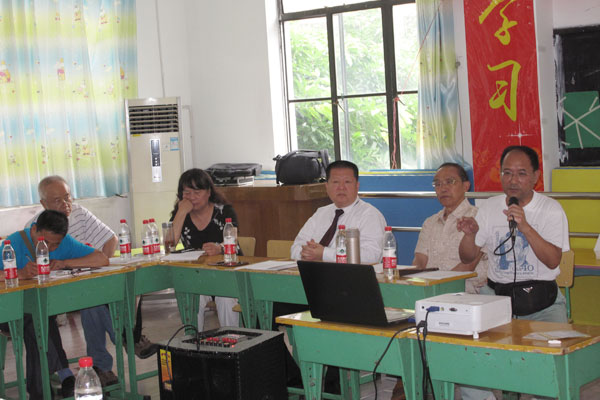 |
|
Some 30,000 Chinese peasants were executed by the Japanese army for saving more than 10 American pilots during the War Against Japanese Aggression (1937-1945), said researcher Liu Changzhu(1st right)in the symposium marking the 75th anniversary of the Flying Tigers. [Photo by Huang Zhiling/chinadaily.com.cn] |
The 75th anniversary of the Flying Tigers has been marked at a symposium held in Chengdu, capital of Southwest China's Sichuan province, on Sunday.
More than 70 years ago, people from around the world launched an indomitable resistant war against fascism.
In 1941, on the Eastern battlefield, General Claire Lee Chennault led his American Volunteer Group to China and fought intense battles against Japanese invaders, with the Chinese army. His volunteer group was known as the Flying Tigers and is a household name in China.
Many times, American bombers took flight from the Xinjin Airport in Sichuan to bomb military targets in Kyushu, Japan. They heavily hit the arrogance of Japanese militarists, says Shen Zaiwang, a senior official of the Sichuan Provincial Association for Friendship with Foreign Countries, during a keynote speech.
Before the arrival of Chennault and his men, Japanese planes bombed Leshan in Sichuan and then flied very low above the nearby Mount Emei, to show off their aviation strength because China had few planes. That's according to Xu Bin, a lawyer with the Junyi Law Office in Chengdu.
Xu, an expert in the Japanese air force's war-time atrocities in Sichuan, helps Chinese victimized during the Japanese planes' indiscriminative bombing of Sichuan to seek justice in Japan.
The Chinese people forged friendships with American pilots during the war against the Japanese invasion. Some 30,000 Chinese peasants in East China's Fujian province were executed by the Japanese army for saving more than 10 American pilots, said Liu Changzhu, a researcher with the General Claire L. Chennault and Governor James A. Noe Research Institute.
He said China's first lady Soong Mei-ling told the story in her public address to the US Congress in 1943.
One of the most critical factors in the Flying Tigers' success was the support provided by China's extensive early warning network, said Dennis James Le Boeuf, vice principal of the Guangya School in Chengdu.
In lonely outposts on hills and in hidden locations across a large part of China, there was a network of air-raid alarm stations with alert Chinese staff equipped with radios and telephones to give instant warning of any approaching Japanese airplanes.
"These early warnings gave the Flying Tigers the critical advantage of having sufficient time to take off in their P-40 fighter airplanes and gain the altitude needed to execute savage diving, or slashing, attacks against invading Japanese aircraft," Dennis said.
His school trains students to be pilots, thanks to foreign co-operation.
During her visit to the school last August, Nell Calloway, granddaughter of Chennault, unveiled a plaque for the Guangya Chennault Flying Tigers Institute together with Qin Guangya, headmaster of the Guangya School.
The school and the General Claire L. Chennault and Governor James A. Noe Research Institute organized the symposium.
